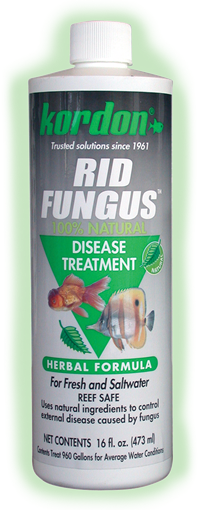

KORDON Rid Fungus 16 oz
Title
- 100% Organic Herbals based on Naphthoquinones
- Helps Prevent and treat Single-Celled External Fish Diseases caused by Fungus
- Equally Effective in Fresh and Salt Water
- Safe for use with Aquatic Invertebrates
- Made in U.S.A.
Kordon Rid-Fungus™ is an easy to use treatment composed of 100% multiple organic ingredients for all types of external and epidermal single-celled infections. It's broad spectrum of activity and lack of toxicity makes Rid-Fungus effective without requiring a specific diagnosis. It stops infectious and external parasitic invasions from getting started and in turn prevents many secondary infections. In short, Rid-Fungus suppresses and eliminates a wide spectrum of infections.
Rid-Fungus is effective against protozoan parasites on fishes and aquatic invertebrates, whether fresh or brackish water, or marine. These comprise dozens of genera and species of fish-infecting species in fresh and salt water, each kind with distinctive characteristics in their infections. The groups include "white spot disease" and other ciliates (Ichthyophthirius in fresh water, and Cryptocaryon, Brooklynella, Trichodina in marine), and "sporozoan parasites" (for which many infectors of aquarium fish are marine).
Item No.39844 RID-FUNGUS™ 4 fl.oz. (118mL) - treats 240 gallons
Item No.39856 RID-FUNGUS™ 16 fl.oz. (473mL) - treats 960 gallonsCompatabilities and Toxicity
Kordon Rid-Fungus as an organic herbal treatment is focused in its effectiveness in treating protozoan, fungal, and dinoflagellate infections. It may be an inhibitor, but is not an eliminator of infectious viruses, bacteria and multi-celled organisms. Rid-Fungus is compatible with the other Kordon organic herbal products, Rid-Fungus can be used with all Kordon Water Conditioners such as the NovAquas, the AmQuels, and Fish Protector.
Regarding the toxicity of Kordon Rid-Fungus to fishes and aquatic invertebrates -- it is not toxic to them. It may be that fishes and aquatic invertebrates die during treatment but numerous repeated experiments at more than ten times dosages of Rid-Fungus have shown that the causes of their deaths are not the Rid-Fungus treatment, nor does it contribute to the causes of deaths. What has caused the deaths besides the infecting diseases, that are too far advanced to be cured by treatment, needs to be determined by the keeper.
Rid-Fungus is safe for use in all kinds of aquariums and ornamental ponds, as well as on scaleless fishes (such as loaches, elephant noses, electric eels, knife fishes and catfishes), coral reef fishes, young fish and fry, reef aquariums, aquatic plants, aquatic invertebrates (such as snails, crustaceans, corals and sea anemones), amphibians and aquatic reptiles.
However, the success of this treatment (as with all effective treatments) is dependent upon starting treatment as soon as infections are anticipated or noted. It often can be late in the extent of infection when it is noted in fishes, which may be too late to save them. As an example, for some species of white spot disease (Ich), the infection usually starts unnoticed in the mouth, gills, and nostrils of the fish, only later appearing on the outside surface of the fish when it may be too late to save their lives by treatment.
Rid-Fungus will not stain sealants, ornaments, plastic or living plants, and will not unduly affect the pH or permanently discolor the water. Rid-Fungus does not affect beneficial nitrifying bacteria.
Regarding Marine Tangs (surgeon fishes, acanthurids): They are prone to have extensive infections that they bring in from the wild, and for which there is no known successful treatment when the infections are too far advanced. Always quarantine tangs before putting them with other fishes.
Regarding Freshwater Sting Rays: Freshwater stingrays (dasyatids) have acclimated to fresh water from marine ancestors. They are fragile in aquarium keeping and prone to infection. They need to be handled carefully. Often their survival time is short in aquarium keeping, regardless of their care, and they are prone to succumb unexpectedly. If this is during treatments for an infection, it can appear that the cause of their demise is the treatment, when in fact it is not.
Regarding Coral Reef Animals: Freshwater snails and shrimp, and the coral reef animals (shrimp, crabs, coral, anemones, etc.) are compatible with Kordon Rid-Fungus. It can be that in setting up a new aquarium with fishes and coral and/or anemones, that with the fishes being infected and being treated, the coral and anemones will shrivel up, sometimes dying. The organic herbal treatment may cause an initial retraction of the coral and/or anemones, but will not be the cause of their dying. Deaths are going to be due to adverse aquarium conditions, and not due to the organic herbal treatment being used for the fishes.
For example, corals and anemones may be adversely affected by the intensity of the aquarium lighting, including in new aquariums. One of the key factors in coral bleaching on natural coral reefs is in excessive light, as well as in excessive water temperature, and other natural factors. If excessive lighting is used in marine aquariums, this can adversely affect corals. This may be immediately, or it may be over time.
$30.99
